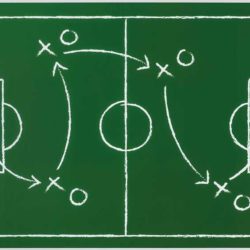Generational wealth for my kids, their kids and beyond is a key priority for the same reason I also prioritized financial independence – as a hedge against an increasingly difficult job market. It’s not that I don’t expect my kids to work. I just don’t want them to get stuck if AI reduces job prospects considerably, or if future careers (and therefore earning potential) are even shorter than careers are now. FI ensured I had options, and generational wealth ensures my kids will, too.
In the last few years, there have been several life changes that have made me more focused on generational wealth. When we became empty-nesters in 2019, we changed our primary residence, and this required another look at our estate plan, which is literally an accounting of how and what we will do with any generational wealth we create. Turning 50 in 2021 has provoked heightened introspection about how I’m spending the years ahead. Making money was a big draw in my early career, and now that we’ve hit our FIRE number, the biggest inspiration for working is solidifying a legacy – professionally but also financially. Finally, the pandemic has made clear how disruption can ensue so quickly, unexpectedly and fiercely. Financial reserves are paramount.
The tricky thing about generational wealth is that you need to build enough reserves that you have something to leave, pass this legacy to one or ideally more than one generation and do it in such a way that you don’t disincentivize each generation’s own agency and will to work. We’re still tweaking the plan. Furthermore, since we’re still in our early 50’s, a lot can happen with our own life situation and the economy that any plan will necessarily be a work-in-progress. Still, here are the 7 steps we’re taking to build generational wealth:
1 – Setting up key estate planning documents

We started the heavy lifting on the estate planning shortly after moving by updating our trusts, powers of attorney and health directives. Not only did our residence change, but our kids are now legally adults and in a much different position to take care of themselves, so the documents were adjusted to reflect that (e.g., no more guardian). There’s no point in amassing enough money to leave your family if it gets stuck in probate or spent down in unnecessary litigation over who’s in charge of what.
One critical piece still missing is organization and sharing of what the key accounts are (e.g., brokerage accounts, bank accounts, rental property addresses), who the critical contacts are (e.g., attorney, accountant, property managers, etc.) and how to access everything (e.g., digital passwords, special instructions). I anticipate recording a fairly long Zoom to do this, but right now I’m just populating a spreadsheet to capture everything that needs to be shared. Of course, this is a moving target because we invariably change or add things over time.
2 – Supporting lifelong learning
Though private college costs as much as a portfolio big enough to FIRE, we opted to send our youngest to private college and are supporting our oldest through graduate school. Both of our kids have student loans, which gives them skin in the game. While our portfolio would be enough to pay the loans for them, part of their education is also financial education on how to budget and manage debt. Once we’re gone, it’s up to them if they spend down the portfolio now to pay off student loans early or spend on something else.
3 – Buying instead of renting in New York
We bought a coop in the Bronx in 2015, even though we were planning to move a few years later, because we wanted our kids to always have a foothold in New York City. Owning an apartment that they could use when starting out after college was a way to help them, while also adding an asset for our portfolio. Yes, there is a cost to maintaining a second residence, especially in an expensive city like New York, and it’s not a cash flow-producing asset (we’re not renting it out). However, the costs are offset somewhat by appreciation and by what we would save on hotels during our frequent trips to the city. It also helps that we bought a small apartment in an outer-borough – helping with cost savings and kid-spoiling prevention (if they want the flashy place in Manhattan, they can hustle for that!).
4 – Managing our drawdowns to preserve principal
One of the biggest moves we made in our paper asset portfolio was moving from a straight buy-and-hold strategy to a tactical asset allocation (TAA) strategy. This is a risk management move, as TAA is focused on smoothing out the market volatility in your portfolio. Avoiding extreme volatility and long drawdown periods is critical because we intend to live off of returns and pass the principal down as generational wealth. This means we have to be disciplined, and our kids have to stay disciplined – we’re not withdrawing any big portfolio-changing sums to cover them.
5 – Investing in rental real estate for cash flow and business potential

Our real estate portfolio has morphed from a peak of 15 properties to our current core group of 10, including rentals and our residences. We started in real estate to have cash flow now that wasn’t tied to our consulting business, and not for generational wealth specifically, but it definitely works as an asset to pass down. Assuming a long life for us (knock on wood) our rentals would be fully paid off for our kids, ensuring a nice cash flow. If they have an interest in real estate, our portfolio could be a starting point – using home equity lines or 1031 exchanges — for their own investing.
6 – Placing bets on where the future is trending
I’m not a gambler, but I did put a single-digit percentage of our portfolio in crypto. I do believe the blockchain technology has legs, even if I’m not sure which, if any, coins will endure. The investment is something I see bolstering the portfolio for our kids and onward, though it could be a nice juice on returns for us. We also put a single-digit percentage of our portfolio in farmland, currently in a REIT for general commercial crops, but also looking into a private placement focused on tech-powered, sustainable agriculture. I’m anticipating that climate change will raise the value of companies successful at optimizing the intersection of tech and environment.
7 – Building passive income streams
While most of the work I most enjoy is high-touch, time-dependent consulting, my current focus has turned to products, affiliate income and other passive income streams. I’ll keep the non-scalable consulting to a part-time schedule for my own enjoyment and professional legacy. But a true asset and therefore financial legacy will be a business that our kids could take over or sell. Sure, I could train my kids to do what I do in HR or Scott could for IT, but they don’t have an interest and that would just be handing them a job, not an asset. This step is very much a work-in-progress, but it would be a very nice, uncorrelated complement to the other steps we’re taking to amass generational wealth.
A byproduct of generational wealth that our kids can enjoy right now is the ability to pursue lower-paying fields
As it turns out our oldest is getting her Masters in Social Work, and our youngest is looking at teaching or working in the arts. None of these career paths is known for big salaries, though they are beneficial roles for society. Knowing we can help with generational wealth makes me feel better about their prospects.
We’re like a patron of their dreams, and I can’t imagine a better use of money than to invest in our kids’ dreams.


 We are Scott and Caroline, 50-somethings who spent the first 20+ years of our adult lives in New York City, working traditional careers and raising 2 kids. We left full-time work in our mid-40’s for location-independent, part-time consulting projects and real estate investing, in order to create a more flexible and travel-centric lifestyle.
We are Scott and Caroline, 50-somethings who spent the first 20+ years of our adult lives in New York City, working traditional careers and raising 2 kids. We left full-time work in our mid-40’s for location-independent, part-time consulting projects and real estate investing, in order to create a more flexible and travel-centric lifestyle.  Financial independence and early retirement is not something we originally focused on, but over time realized it was possible. Our free report,
Financial independence and early retirement is not something we originally focused on, but over time realized it was possible. Our free report, 








We would have paid for our kids four year degrees but all three got totally free rides even with millionaire parents. We didn’t pay for grad school or medical school and we told them we’d only pay the cost of in state public universities and only for vocational degrees that led to good jobs. One business major and two engineering majors resulted. One engineer is now also an MD but it was on his nickel. I’m all about pursuing passions but if passion leads to a low paying job then we told them to get a higher paying job doing something else and pursue passion in your free time. I realize that’s just my personal view and it might be a bad one at that, but my wife felt the same way and they were our kids, so it was our call. I would never criticize you for doing what made sense to you and I do agree some jobs that don’t pay high wages are infinitely valuable to society and can lead to great job satisfaction and purpose. I’m one of the very unusual bloggers who actually did inherit seven figures from my parents. We were already multimillionaires at the time so it hardly moved the needle for us. But because we went through it I have a perspective that should have been obvious to me earlier. The fact is, most inheritances don’t come until both parents die. And with modern health care one parent usually makes it to their late eighties, sometimes much longer. What few people really think about is that means your kids will be old when they inherit your money. They’ll already be retired in most cases. I was nearly 60. And inheriting money, even a lot of money when you are 60 doesn’t change your life. Its too late. It can give your kids more retirement padding but it is simply too late in life to matter much. The idea of real generational wealth doesn’t really work much except in uber wealthy families where the kids start to get big stipends or high paying jobs at the family corporations as young adults. For most of us our kids will be so old when they get the money that if they’ve prepared for retirement they really don’t need it and won’t spend a penny of it. Your kids won’t have a better life due to an inheritance in their old age. If they earn median incomes they’ll lead median income lifestyles until retirement. On paper my parents’ money should have let us spend more in retirement but after a relatively frugal like why would we force ourselves to double our spending when we are very happy now? That’s kind of a generational wealth I guess but its more like insurance nobody will ever use or enjoy. Now some people talk like they’ll give the money to their kids in their 30’s or 40’s but if you are living on a 4% safe withdrawal rate in retirement then you don’t have much surplus to give them all that much without sacrificing the retired life you worked so hard for.
Congrats on your kids getting scholarships — that’s definitely a big help to preserving wealth. I agree that the term “generational wealth” normally is used with Rockefeller-type wealth, but I still think that a more simple inheritance — even if it comes later in life or is simply a supplement and not a FIRE-worthy bequeath — still counts. I count being able to maintain our NY place so our older one can go to grad school there and not worry about the very high rents as a form of generational wealth. I think it’s like FIRE in that sense — people have multiple definitions as to what counts!
This was fascinating! Thank you for sharing! May I ask what REIT you’re investing in focused on tech-powered, sustainable agriculture? Thank you for any insight you can provide! 🙏
Thank you for catching that — I actually recently edited that section to be clearer. The REIT we invested in is for general commercial crops (FPI), and we’re still considering the other more specialized farmland play, but it’s a private placement so more involved. If we pull the trigger, we’ll post!